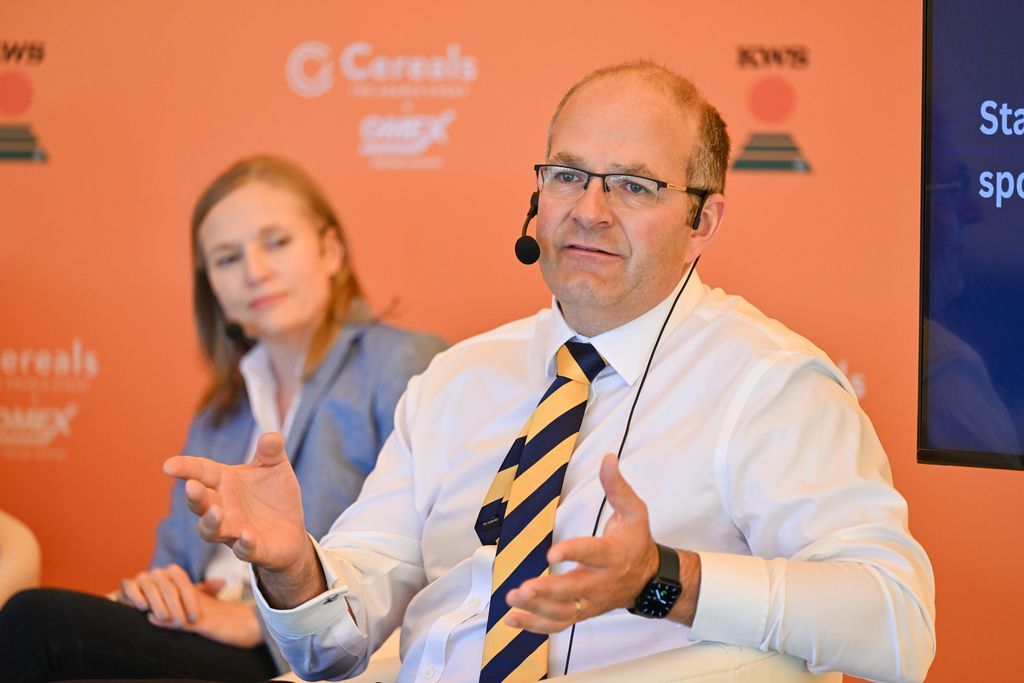Food security must be a priority

The UK is facing serious instability in the coming years, given escalating global conflicts and climate change – so the Government must make food security a total priority.
That’s according to key speakers during the first day (Wednesday, 11 June) of this year’s Cereals Event in Lincolnshire. “If we live in a volatile world where we’ve got to commit to rearming, then the other side of that is food security,” said NFU president Tom Bradshaw. “If the Government is serious about the defence risks it’s got to look at food security.”
Mr Bradshaw urged the Government to work with farming organisations to create policy that is supportive and fit for the future. “The transition from opposition to Government has been very difficult and their lack of experience has shown through,” he explained. “The policies of the past 10 months have overtaken everything, and the industry hasn’t recovered. They have not only upset the apple cart, they’ve filled it with dynamite and blown it to smithereens.”
Energy security is also important – and that goes beyond long-term investment in nuclear power. Given the threat that the trade deal with the US poses to the British bioethanol industry, it’s something that needs to be considered, said Diana Overton, managing director at Frontier Agriculture. “The Vivergo and Ensus biofuel plants are so important to the industry. Energy security is critical, so we need more cross-departmental thinking in Government.”
The cereals sector has had a tough two years, with poor weather causing historically small crops, while market values remain below the cost of production due to high input costs. The fairness in the supply chain review could help here, or at least provide transparency into the pricing of inputs like fertiliser.
But farmers need to invest to cope with the changing climate, and when it comes to building more reservoirs there are challenges to overcome, said Mr Bradshaw. “It’s currently more difficult to get permission for a reservoir than for the Sizewell C nuclear plant.”
As well as improving productivity and resilience, there are environmental benefits from creating more reservoirs, and he would like to see them given permitted development rights. Right now, lining up planning permission and Environment Agency permits with the Farming Equipment and Technology Fund (FETF) grant window just doesn’t work.
Fortunately, visitors to the Cereals Event had the chance to see plenty of equipment that is eligible for the FETF, and to speak to experts about water storage and drainage solutions. And for those interested in developing new farm technologies, there is the Accelerating Development of Practices and Technology (ADOPT) grant scheme, funded by Defra.
This offers grants of between £50,000 and £100,000 to help farmers develop ideas that offer practical solutions to improve productivity, resilience and sustainability, said Wallace Currie, knowledge exchange manager at the UK Agri-Tech Centre. As well as a £2,500 grant to facilitate the project, there are expert advisers to help signpost additional funds and collaborators.
“There are so many positive solutions available, from farmer-led innovation to new technology and data-led advice,” said Alli McEntyre, Cereals Event director. “Although the arable sector is facing challenges, farmers are ever resilient and solution-driven, something that was extremely evident in the positive event vibe.”
|https://cdn.asp.events/CLIENT_Haymarke_CB6BD562_5056_B731_4CF17C014C89B355/sites/cereals-2025/media/libraries/exhibitors/MF-logo-1-.jpg/fit-in/640x9999/filters:no_upscale())
|https://cdn.asp.events/CLIENT_Haymarke_CB6BD562_5056_B731_4CF17C014C89B355/sites/cereals-2025/media/libraries/exhibitors/EFM-1-.jpg/fit-in/640x9999/filters:no_upscale())
|https://cdn.asp.events/CLIENT_Haymarke_CB6BD562_5056_B731_4CF17C014C89B355/sites/cereals-2025/media/libraries/exhibitors/AF-logo-1-.jpg/fit-in/640x9999/filters:no_upscale())
|https://cdn.asp.events/CLIENT_Haymarke_CB6BD562_5056_B731_4CF17C014C89B355/sites/cereals-2025/media/libraries/exhibitors/farm-contractor-retina2.png/fit-in/640x9999/filters:no_upscale())
|https://cdn.asp.events/CLIENT_Haymarke_CB6BD562_5056_B731_4CF17C014C89B355/sites/cereals-2025/media/libraries/exhibitors/ISUZU UK LTD_logo.png/fit-in/640x9999/filters:no_upscale())
|https://cdn.asp.events/CLIENT_Haymarke_CB6BD562_5056_B731_4CF17C014C89B355/sites/cereals-2025/media/libraries/exhibitors/the-central-association-of-agricultural-valuers.png.png/fit-in/640x9999/filters:no_upscale())
|https://cdn.asp.events/CLIENT_Haymarke_CB6BD562_5056_B731_4CF17C014C89B355/sites/cereals-2025/media/libraries/exhibitors/e5fe77f9-2834-11ed-b1330a410bd8e1d9-logo.jpg/fit-in/640x9999/filters:no_upscale())
|https://cdn.asp.events/CLIENT_Haymarke_CB6BD562_5056_B731_4CF17C014C89B355/sites/cereals-2025/media/libraries/exhibitors/451f51e8-b7dc-11ef-b52-06bd0f937899-logo.jpg/fit-in/640x9999/filters:no_upscale())
|https://cdn.asp.events/CLIENT_Haymarke_CB6BD562_5056_B731_4CF17C014C89B355/sites/cereals-2025/media/libraries/exhibitors/sykes-holiday-cottages.jpg.jpg/fit-in/640x9999/filters:no_upscale())
|https://cdn.asp.events/CLIENT_Haymarke_CB6BD562_5056_B731_4CF17C014C89B355/sites/cereals-2025/media/libraries/exhibitors/uk-agritech-centre.png.png/fit-in/640x9999/filters:no_upscale())
|https://cdn.asp.events/CLIENT_Haymarke_CB6BD562_5056_B731_4CF17C014C89B355/sites/cereals-2025/media/libraries/exhibitors/Tees_POS_RGB.jpg/fit-in/640x9999/filters:no_upscale())
|https://cdn.asp.events/CLIENT_Haymarke_CB6BD562_5056_B731_4CF17C014C89B355/companyProfiles/19AFED0-8CFA-4C6B-A02F-EE49E7FE9A24-logo.jpg/fit-in/640x9999/filters:no_upscale())
|https://cdn.asp.events/CLIENT_Haymarke_CB6BD562_5056_B731_4CF17C014C89B355/sites/cereals-2025/media/libraries/exhibitors/PREMIUM CROPS_Logo.jpg/fit-in/640x9999/filters:no_upscale())
|https://cdn.asp.events/CLIENT_Haymarke_CB6BD562_5056_B731_4CF17C014C89B355/sites/cereals-2025/media/libraries/exhibitors/5f0c9802-b7dc-11ef-b52-06bd0f937899-logo.jpg/fit-in/640x9999/filters:no_upscale())
|https://cdn.asp.events/CLIENT_Haymarke_CB6BD562_5056_B731_4CF17C014C89B355/companyProfiles/FF5EBF7-26C6-4F39-9F42-C694FEBA2D7F-logo.png/fit-in/640x9999/filters:no_upscale())
|https://cdn.asp.events/CLIENT_Haymarke_CB6BD562_5056_B731_4CF17C014C89B355/sites/cereals-2025/media/libraries/exhibitors/NROSO_Logo.png/fit-in/640x9999/filters:no_upscale())
|https://cdn.asp.events/CLIENT_Haymarke_CB6BD562_5056_B731_4CF17C014C89B355/sites/cereals-2025/media/libraries/exhibitors/NITRASOL_logo.png/fit-in/640x9999/filters:no_upscale())
|https://cdn.asp.events/CLIENT_Haymarke_CB6BD562_5056_B731_4CF17C014C89B355/sites/cereals-2025/media/libraries/exhibitors/NIAB-CORRECT-LOGO.png/fit-in/640x9999/filters:no_upscale())
|https://cdn.asp.events/CLIENT_Haymarke_CB6BD562_5056_B731_4CF17C014C89B355/sites/cereals-2025/media/libraries/exhibitors/NAAC_Logo_final.jpg/fit-in/640x9999/filters:no_upscale())
|https://cdn.asp.events/CLIENT_Haymarke_CB6BD562_5056_B731_4CF17C014C89B355/sites/cereals-2025/media/libraries/exhibitors/KWS_Logo_RGB-2-.png/fit-in/640x9999/filters:no_upscale())
|https://cdn.asp.events/CLIENT_Haymarke_CB6BD562_5056_B731_4CF17C014C89B355/sites/cereals-2025/media/libraries/sponsors-list/Farmers-Weekly.png/fit-in/640x9999/filters:no_upscale())
|https://cdn.asp.events/CLIENT_Haymarke_CB6BD562_5056_B731_4CF17C014C89B355/sites/cereals-2025/media/libraries/exhibitors/9c88e4c0-7794-11ec-910-06e21988b83f-logo.jpg/fit-in/640x9999/filters:no_upscale())
|https://cdn.asp.events/CLIENT_Haymarke_CB6BD562_5056_B731_4CF17C014C89B355/sites/cereals-2025/media/libraries/exhibitors/CERES RURAL_logo.png/fit-in/640x9999/filters:no_upscale())
|https://cdn.asp.events/CLIENT_Haymarke_CB6BD562_5056_B731_4CF17C014C89B355/sites/cereals-2025/media/libraries/exhibitors/56aed295-bb58-11ec-910306e21988b83f-logo.png/fit-in/640x9999/filters:no_upscale())